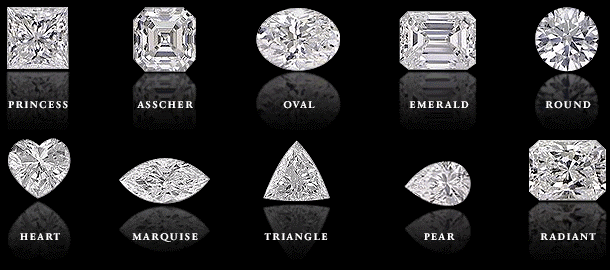The 4 C’s of Diamonds
Fine Diamonds are among the most coveted of all gems. Their value, however, differs widely from one diamond to another. Experts evaluate every diamond for rarity and beauty, using four primary guidelines. These are called The Four C’s– Cut, Color, Clarity, and Carat Weight.
Cut
When you think of the cut, you probably think of the shape of the diamond. You are partially correct. While cut does refer to shape, it also refers to the proportions of how the diamond is actually cut.
Diamonds are cut into many different shapes, reflecting not only popular taste but the proportions and quality of the rough diamond. The most popular shapes include Round, Oval, Square, Princess, Emerald, Baquette, and Marquise cuts. Many specialty shapes are also available.
A diamond’s overall proportions, as well as the size and placement of its many reflective surfaces or facets, also play a large part in “cut”. The consistency and balance of these can greatly affect how the stone captures light and reflects it back to the eye.
Color
With the exception of some fancy colored diamonds, the most valuable diamonds are those with the least color. The color scale for transparent diamonds run from D-F (colorless), G-J(near colorless), K-L (faint yellow), to Z(light yellow). Completely colorless diamonds are rare.
When Diamonds are formed with traces of other minerals, rare and beautiful colors can result. These “fancy” colors range from blue to brilliant yellow to red, brown, pale green, pink, and violet. Because of their rarity, colored diamonds are highly desirable and may be quite valuable.
Clarity

A diamond’s clarity is measured by the existence, or absence, of visible flaws. Tiny surface blemishes or internal inclusions– even those seen only under magnification with a jeweler’s loupe– can alter the brilliance of the diamond and, thus, effect its value. Clarity levels begin with Flawless (IF& F) and move down to Very Very Slight (VVS1, VVS2) Very Slight ( VS1 & VS2), Slightly Included (SL1 & 2), and Included (I1,2 & 3).
Fl, IF Diamonds Flawless: No internal or external flaws
Internally Flawless: No internal flaws
VVS1, VVS2 Diamonds Very, Very Slightly Included: Very difficult to see inclusions
with 10x magnification
VS1, VS2 Diamonds Very Slightly Included: Inclusions are not typically visible to the
unaided eye
SI1, SI2 Diamonds Slightly Included: Inclusions are visible under 10x
magnification and may be visible by the unaided eye
I1, I2, I3 Diamonds Included: Inclusions are visible with the unaided eye
Carat Weight
The size of a diamond is measured, not by its dimensions, but by weight. One carat, the traditional unit of measure for diamonds, is equal to approximately 0.2 grams. You may also hear the weight of a diamond referred to in points. A point is equal to 1/100 of a carat; therefore, a 75-point diamonds equals 0.75 carat. Diamonds of equal weight may appear slightly different in size, depending on their depth and proportions. Because they are quite rare, larger diamonds of gem quality are much more valueable.
Rarity & Beauty
All gem-quality diamonds are rare, taking billions of years for nature to form them. The journey from the mine to you is long and arduous. While the four C’s information helps you to identify the quality of the diamond you are purchasing, it is the combination of these four characteristics which determine a diamond’s rarity. If you imagine a four-sided pyramid, with each side being a diamond characteristic — the more readily available diamonds form the base of the pyramid while the rarest diamonds are at the top. Keep this pyramid in mind when you are selecting your diamond. Your selection of characteristics will determine rarity and value. And remember — beauty is in the eye of the beholder. A diamond can only be truly perfect if you think it is beautifully perfect for you.

